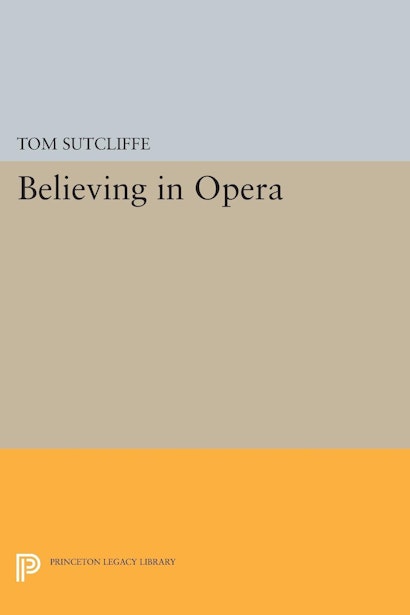The staging of opera has become immensely controversial over the last twenty years. Tom Sutcliffe here offers an engaging and far-reaching book about opera performance and interpretation. This work is a unique tribute to the most distinctive and adventurous achievements in the theatrical interpretation of opera as it has developed in recent decades. Readers will find descriptions of the most original and successful avant-garde opera productions in Britain, Europe, and America. Sutcliffe beautifully illustrates how updating, transposition, or relocation, and a variety of unexpected imagery in opera, have qualified and adjusted our perception of the content and intention of established masterpieces.
Believing in Opera describes in detail the seminal opera productions of the last fifty years, starting with Peter Brook in London after the war, and continuing with the work of such directors and producers as Patrice Chéreau in Bayreuth, Peter Sellars and David Alden in America, Ruth Berghaus in Frankfurt, and such British directors as Richard Jones, Graham Vick, Peter Hall, and David Pountney. Through his descriptions of these works, Sutcliffe states that theatrical opera has been enormously influenced by the editing style, imagery, and metaphor commonplace in the cinema and pop videos. The evolution of the performing arts depends upon revitalization and defamiliarization, he asserts. The issue is no longer naturalism, but the liberation of the audience’s imagination powered by the music.
Sutcliffe, an opera critic for many years, argues that opera is theater plus music of the highest expressive quality, and as a result he has often sided with unconventional and novel theatrical interpretations. He believes that there is more to opera than meets the ear, and his aim is to further the process of understanding and interpretation of these important opera productions. No other book has attempted this kind of monumental survey.
Originally published in 1997.
The Princeton Legacy Library uses the latest print-on-demand technology to again make available previously out-of-print books from the distinguished backlist of Princeton University Press. These editions preserve the original texts of these important books while presenting them in durable paperback and hardcover editions. The goal of the Princeton Legacy Library is to vastly increase access to the rich scholarly heritage found in the thousands of books published by Princeton University Press since its founding in 1905.
"One comes away more fully understanding what lies behind the work of the people he has chosen. . . Believing in Opera is an impressive achievement, reflecting great credit on one of the finest music critics in the business."—Patrick Smith, Opera News
"This book is an eloquent, persuasive celebration of the exciting achievements of contemporary opera production and design."—Anthony Arblaster, Opera
"An engrossing. maddening, important book, which should be required reading for operagoers of every stripe."—Max Loppert, Opera
"Clearly a laudable, novel and timely enterprise, the fruit of which adds significantly to our knowledge."—Christopher Wintle, Times Literary Supplement
"For the eager, curious opera lover, this is a valuable account of the recent past, a map of territory conquered, which will serve as a guide to future pleasures."—Sir Jeremy Isaacs, The Guardian
"Sutcliffe's book is hugely worthwhile. . . a feast of material craving assent and disputation. It will be read with recognition and pleasure by anyone wanting to test their own impressions against those of an impassioned advocated of the shock of the new."—Patrick Carnegy, The Spectator
"Anyone seriously interested in the future of opera, whether they are in Mr. Sutcliffe's camp or not, should read this book."—Michael Kennedy, Sunday Telegraph
"This specialized, sturdily bound, thoroughly indexed book will arouse the interest of general and professional opera lovers."—Choice
"Believing in Opera is an impressive achievement, reflecting great credit on one of the finest music critics in the business."—Opera News
"Any study of this field must proceed from both knowledge and insight. Tom Sutcliffe possesses both. We come away from this book with a much clearer understanding not only of the directors themselves but, more importantly, of the ethos of this attempt to venture beyond the literalism of opera stagings. In an environment where productions of opera will increasingly depart, often radically, from the 'norm'—as I believe will occur in the next decade—it is imperative to be able to understand the bases for these rethinkings. This book is of major importance to the field of opera today."—Patrick Smith, editor-in-chief of Opera News, and author of The Tenth Muse
"Tom Sutcliffe's new book Believing in Opera is an important explanation of how opera theatrically ticks and why it should. It is hugely entertaining for fans, professionals, and all those interested in the way opera production has developed since the War. Whether you love opera as theatre or would rather have concerts in costume, this book is for you and it clearly explains what directors actually do and why."—Peter Jonas, Intendant of the Bavarian State Opera
"Believing in Opera, as the title implies, is an affirmation of faith in an art form which some authorities have pronounced to be dead or dying; faith in the music, faith in the artists who perform it, and faith in the process of interpretation which brings the operatic repertoire on to the stage and makes it emotionally and intellectually alive for the audience. Tom Sutcliffe draws on thirty years of regular experience of European opera to illustrate his passionate belief that the theatrical vitality and imagination brought to the opera house by talented and adventurous producers and designers are indispensable elements in the appreciation of opera at the end of the twentieth century. This book is a vigorous defense of opera stagings which challenge and enrich our understanding of the masterpieces of the repertoire. Tom Sutcliffe defines the crucial role of live theatre in our modern society."—Hugues Gall, Director of the Paris Opera

